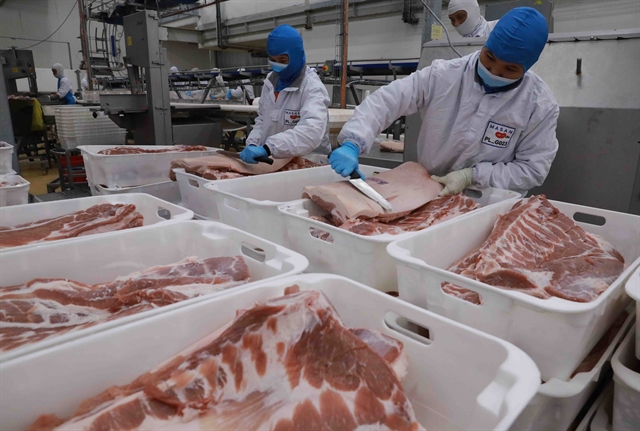 Economy
Economy


|
| Processing chilled meat at Masan MEATLife Joint Stock Company under European standards. There is no sign of a shortage of pork supply as in the first quarter of 2023. — VNA/VNS Photo Vũ Sinh |
HÀ NỘI — Analysts expect meat producers to record more positive business results in 2023 thanks to lower input costs and higher average live hog prices.
According to Hà Thu Hiền, an analyst from VNDIRECT Securities Joint Stock Company, global agricultural product prices would maintain a downward trend in 2023 thanks to the increase in the supply of most food items.
In addition, Ukraine continues to return to supplying agricultural products to the world market.
Corn and soybean meal prices are forecast to decrease by 7.9 per cent and 1.8 per cent respectively in 2023. Therefore, VNDIRECT expects that feed costs will gradually decrease from the second quarter of 2023. Meat producers will record improved gross profit margin this year.
In addition, low feed costs will have a positive impact on smallholder farmers. However, in the long term, the farmers will be cautious in re-herding because they observe price fluctuations of live hogs in the market.
The farmers also do not have enough capital to immediately re-herd on a large scale because they have suffered losses for two consecutive years because of low hog prices.
The experts from VNDIRECT still believe that the supply will not be significantly affected next year.
An expert from Agribank Securities Joint Stock Company (Agriseco) also said that the price of input materials for animal feed production gradually cooled down. Besides that, a reduction in the animal feed tax was expected.
The Việt Nam Animal Feed Association has recently proposed reducing the import tax on soybean meal from 2 per cent to zero to support businesses.
Agriseco expects live hog prices to recover after bottoming out. The live hog price now is at VNĐ50,000 per kilo. It believes that hog prices may recover this year because the demand for food increases again when the tourism and service industries resume.
Hiền from VNDIRECT said the domestic hog price had recovered after six consecutive months of decline. The volume of pigs sold off to the market due to the impact of African swine fever had gradually decreased. While concerns about oversupply had subsided as farmers stopped re-herding activities. The large livestock enterprises also had not yet planned to expand their pig herd.
In addition, supply from smallholder farmers dropped sharply after a long period of losses due to a sharp increase in feed prices while live hog prices remained low.
At present, there is no sign of a shortage of pork supply as in the first quarter of 2023, the total pig herd in the country still increased by 6.2 per cent on year, equivalent to the period before African swine fever (ASF) and live hog production increased by 7.5 per cent on year, according to the expert.
After the price drop in the first quarter of 2023, the domestic live hog prices started a slight increase from the beginning of April of 5.3 per cent on month and 0.1 per cent compared to the beginning of this year. But it was still below 3.5 per cent on year.
The live hog price is expected to increase slightly in the second quarter of 2023 and will improve further in the third quarter of 2023 when the demand for pork recovers.
In the basic scenario, VNDIRECT believes that the live hog price will increase by 5 per cent on year to VNĐ59,000 per kilo this whole year thanks to a recovery in China pork prices when this economy reopens.
However, the average production cost of the smallholder farmers now is about VNĐ55,000-60,000 per kilo of pork.
Therefore, VNDIRECT does not expect the farmers to re-herd strongly in the short term.
The Vietnam Livestock Association said that there were about 45-50 per cent of large farms suspending production while 70-75 per cent of mid and small farms and livestock households temporarily stopping re-herding. Because the input costs have surged while the selling price is low.
Despite the prospect of recovery, meat producers are hesitant to make plans to expand production, according to VNDIRECT.
The two leading enterprises in the livestock industry, Dabaco Vietnam Group Joint Stock Company (stock code: DBC) and Masan MEATLife Joint Stock Company (stock code: MML), have not yet announced specific expansion plans.
Most businesses believed that the meat industry faced difficulties in the first six months of 2023 due to weak demand.
This is also the reason why 3F companies developing feed - farm - food (3F) model postponed making production expansion plans, except for players that want to penetrate deeper into the domestic meat industry such as BaF Vietnam Agriculture Joint Stock Company (stock code: BAF) and Hoang Anh Gia Lai Joint Stock Company (stock code: HAG).
In 2023, BaF Vietnam Agriculture Joint Stock Company plans to build three new farms including one in Bình Phước with a capacity of 6,250 breeding pigs and 30,000 meat pigs. Two others are in Nghệ An with a total capacity of 5,000 breeding pigs and 90,000 meat pigs.
In addition, the company also targets to expand its distribution network through the Siba supermarket system and the Meat shop system.
Meanwhile, its new rival, Hoang Anh Gia Lai Joint Stock Company, has also planned to build its own distribution system in 2022-2023.
However, at a recent shareholders meeting, Hoang Anh Gia Lai announced that it would increase franchised stores to 80 per cent of its total stores instead of building its own branded stores due to insufficient capital.
According to VNDIRECT experts, the livestock enterprises still face risks such as prolonged tension between Russia and Ukraine affecting shipping activities in the Black Sea that could put pressure on global grain prices. African swine fever outbreaks could affect meat supply in 2023. Additionally, consumers tightening spending could lead to weaker-than-expected meat demand, including pork. — VNS




